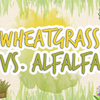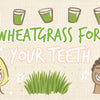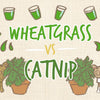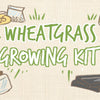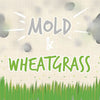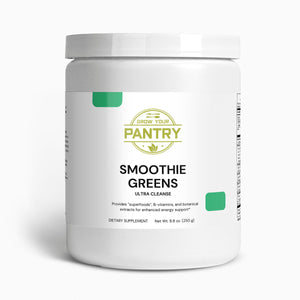Is Wheatgrass Gluten-Free? The Celiacs Guide
Yes, wheatgrass is gluten-free. However you need to be very careful to make sure that you don’t consume any of the kernels or seeds that they sprout from, as they do contain gluten. If you suffer from celiac disease it’s advisable to not consume wheatgrass or if you do to take great precautions before consuming for contamination is highly-likely.
If you do consume wheatgrass and are allergic to gluten, make sure that you purchase from a reputable supplier that has gluten-free on the packaging. Otherwise you’re placing yourself at substantial risk.
In this article we’ll explore what wheatgrass is, why it’s gluten free, how to consume, and the best options for those intolerant and allergic to gluten.
What Is Wheatgrass?
Wheatgrass is the grass grown from wheat seeds. It typically is ready to eat after 7-10 days, where the long green shoots can be cut before processing them. Often you’ll consume wheatgrass in the form of juice shots, in smoothies, or just by chewing on them.
Although wheatgrass has been eaten for hundreds if not thousands of years, only in recent times has it shot to popularity for the purported health benefits. Becoming popular by health enthusiasts, now you’re able to find juice shots in grocery stores and supplements online too.
If you’re allergic to gluten be sure to check the seller’s instructions and packaging before purchasing.
What Is Gluten And Gluten-Free?
Gluten - Gluten is a group of proteins that are found in starch and cereal grains. Common everyday items you’ll find them in are breads, cereals, pasta and biscuits - although due to the prevalence of gluten they appear in many different foods too.
Gluten-Free - Due to many abstaining from the consumption of gluten many gluten-free alternatives now exist. Some refine the existing ingredients, such as flour, to remove the gluten, whilst others will use a substitute ingredient to be able to make products without. Previously many complained about the taste of gluten-free products often moaning that the texture was not similar and the taste was bad too.
After a lot of research and development the gluten-free alternatives have come a long way tasting very similar to their gluten counterparts. In grocery stores these alternatives are now widely available. For more gluten-free reading.
Why Do People Eat Gluten-Free?
There are many reasons people choose to abstain from eating gluten, the most common are gluten allergies (celiac’s disease), gluten-intolerance, for purported health benefits and also due to strict diet plans that ban gluten consumption.
Celiac Disease - If you’re allergic to gluten you must avoid all forms. Even the smallest trace can trigger a full allergic reaction.
Purported Health Benefits - More recently there are many that believe the consumption of wheat increases inflammation and therefore abstain from eating and say they feel a lot healthier. Although not intolerant or allergic they claim to have more focus, less tiredness and increased energy.
Special Diets - Certain popular diets such as the paleo diet prohibit the consumption of gluten. They claim that it is not optimal fuel for our bodies due to being a modern food source. They state that you should not consume any grains as our paleolithic ancestors would not have had access to them.
Why Is Wheatgrass Gluten-Free?
Although wheat kernels, seeds and the finished wheat crop all contain the gluten, the grass that grows after sprouting for 7-10 days does not contain any gluten. Although it’s probable to have been contaminated with gluten for the fact that they have touched and been around the gluten containing seeds. Therefore it’s unlikely that your wheatgrass doesn’t contain some traces of gluten. For more reading about why celiacs shouldn't eat wheatgrass.
Other Forms Of Wheatgrass And Gluten
Is Wheatgrass Powder Gluten Free?
This will be dependent on the brand that produces the wheatgrass. As often they may contain trace amounts due to contamination. As a lot of factories produce multiple types of powders they may have produced gluten containing products, which would contaminate the wheatgrass powder.
Is Wheatgrass Juice Considered Gluten Free?
Again, this will depend on the producer. If you’re allergic to gluten it is not advisable to consume. Speak to the producer to understand if their product is gluten free or not.
Buying Gluten-Free Wheatgrass
Gluten Free Certified - This is the gold standard to know whether or not you can consume wheatgrass whilst having an allergy. To get the certificate the producer has to adhere to strict guidelines that have been approved to meet the standard.
Common Questions
Is Wheatgrass Bad For Celiacs?
Wheatgrass certainly could cause celiacs to have an allergic reaction. It’s very easy to contaminate your wheatgrass or buy contaminated wheatgrass. It’s recommended to avoid wheatgrass if you’re allergic to gluten.
Is Wheatgrass The Same As Wheat?
No wheatgrass is the 7-10 day old sprouted wheat seed. Whereas wheat is produced once the plant becomes fully grown.
Is Wheatgrass Keto?
Yes, wheatgrass contains very minimal carbohydrates and can be enjoyed whilst following a ketogenic diet.
What Are The Benefits Of Wheatgrass?
Wheatgrass contains high levels of chlorophyll which are said to help with anti-aging, detoxification, skin healing and even a natural deodorant. Source: Healthline.com.
Is Barley Grass The Same As Wheatgrass?
No, barley grass is the 7-10 day barley shoot, and wheatgrass the 7-10 day old wheat shoot. They both come from different seeds and sources making them two distinctly different grasses.
Does Organic Wheat Contain Gluten?
Yes, all wheat contains the protein gluten.
Is Wheatgrass Powder Healthy?
Wheatgrass powder contains high levels of chlorophyll and other micronutrients. Which have many purported health benefits and can be considered healthy.
Is Wheatgrass A Grass?
Yes! Wheatgrass is part of the grass family.


